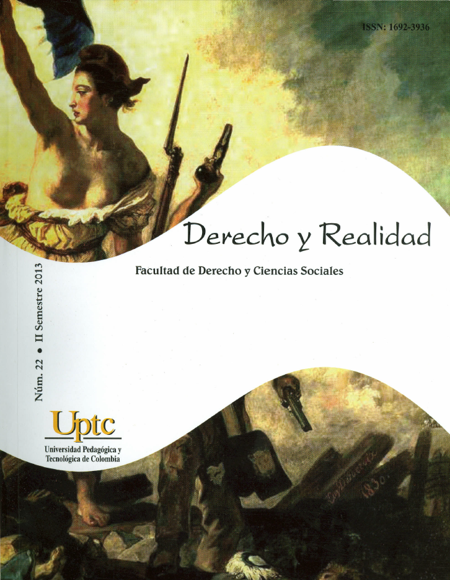Philosophical, ethical, legal and politicalfoundations for the study of the interrelationshipbetween human rights and democracy

Abstract
The approach to the conflictive and polysemic meanings of the concepts of human rights and democracy plays a significant role in the benchmarks, perspectives and aims of the researcher in question. Therefore, a true and accurate understanding of the functions of philosophy to facilitate analysis of human rights and democracy, allows pausing in the assessment of the significance of ideological and legal component in the study of the interaction between them. If the philosophies renounce the concrete utopian intention to intervene actively in the improvement of human behavior, such as the study of human rights in their possible link with democracy, they stop being philosophies, such as when they are thoughtlessly subordinated to political ideological or legal positions rather than promote them rationally.Keywords
human rights, democracy, philosophy, epistemology, analysis, society
References
Ainsa, F. (2002). La impostergable utopización de la democracia. Utopía y praxislatinoamericana. Revista internacional de filosofía iberoamericana y teoríasocial, 35. Universidad del Zulia, Maracaibo.
Guadarrama, P. (1998). ¿Para qué filosofar? (Funciones de la filosofía). Revistade Filosofía, (30), 109-139. Centro de Estudios Filosóficos Adolfo GarcíaDíaz. Recuperado de http://www.filosofia.org/mon/cub/dt021.htm
Guadarrama, P. (2008, I semestre). Los derechos humanos ante el conflicto modernidad y posmodernidad. Nova et Vetera, 59-73. Escuela Superior deAdministración Pública. Bogotá. Recuperado de http://biblioteca.filosofia.cu/php/export.php?format=htm&id=2555&view=1
Guadarrama, P. (2009, II semestre). Democracia y derechos humanos:¿”Conquistas” exclusivas de la cultura occidental? Nova et Vetera, 79-96.Escuela Superior de Administración Pública, Bogotá. Recuperado de http://www.espaciocritico.com/
Guadarrama, P. (2012). Pensamiento filosófico latinoamericano. Humanismo,método e historia. Tomo I y II. Bogotá: Planeta.
Lechner, N. (1985, mayo-agosto). De la revolución a la democracia. El debateintelectual en América del sur. Opciones, (6). Santiago de Chile.
Maturana, H. (1995). La democracia es una obra de arte. Bogotá: Mesa RedondaMagisterio.
Muguerza, J. (2006). La alternativa del disenso. En J. Muguerza. Fundamentaciónde los derechos humanos. (p. 153). Madrid: Debate.
Pérez, A. (1999). Los desafíos de la Paz y los derechos humanos en el NuevoMilenio. En UNESCO-Universidad Federal de Paraná. Por una cultura depaz. (p. 52). Brasil: s.n.
Smith, P. H. (1992, octubre-diciembre). Crisis y democracia en América Latina.Desarrollo Económico: Revista de Ciencias Sociales,31(123), 375. BuenosAires.
Zuleta, S. (1995). Educación y democracia. Un campo de combate. Bogotá:Corporación Tercer Milenio